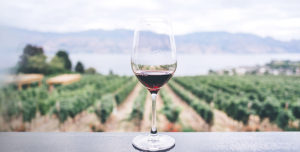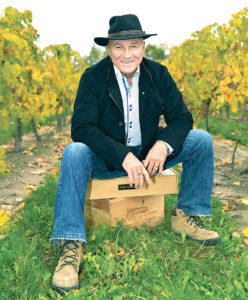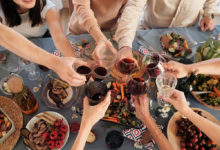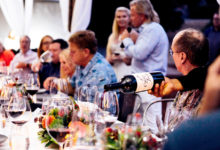“If the weather holds up, we will have a great harvest” – Donald Ziraldo

September has arrived, and with it the wine has arrived. Wine-making culture goes back thousands of years. In literature, wine is often connoted with happiness and friendship, symbolizing sustenance and life. From homemade wine fabricated in the house cellar to those bought from a local winery, one thing is guaranteed, there’s always a bottle when it’s time for a dinner or a special celebration.
For the program Here’s The Thing (Camões TV), Manuel DaCosta had the pleasure to interview Donald Ziraldo, a Canadian entrepreneur and wine-making business legend. Born in St. Catharines, Ontario and coming from an Italian family, Ziraldo was enticed to the wine-making business at an early age. He co-founded the Inniskillin Wines Inc. on Niagara-on-the-Lake in 1975. Since then, he has been recognized numerous times for his product quality and his expertise. From spending seven years in Portugal studying the process of making Port to mastering Ice Wine, he is certainly the best person to explain the wine business to us.
Manuel DaCosta: Why did you want to be a winemaker?
Donald Ziraldo: I grew up on a farm in an Italian family. It’s in your blood that you will be a wine drinker. I drank my first glass of wine when I was eight years old with my father. That’s part of the culture in Italy as it is in Portugal, where I had the pleasure of working in Douro for about seven years making Port. It was just a natural evolution. I was in the nursery business, and I met an Austrian guy looking for grapes that didn’t have that Canadian flavour, that foxiness… he wanted the European types. That’s how it all started, very innocently. My interest in the nursery grew into supplying European grapes. That’s how I got involved with Kaiser and started a winery. Very naïve at the beginning, it involved a lot of hard work.
MDC: You grew it into an incredible winery. You left for about 10 years, and now you are back managing the Ice Wine division. Is Ice Wine the product that is closer to your heart?

DZ: Absolutely. When Karl and I started the winery back in ‘75, our intent was to make table wine. We slowly graduated from the hybrids to the viniferous, like Pinot Noir and Chardonnay, as we became more skilled at growing the European varieties. Once the Ice Wine phenomenon happened in ‘91, we won the award that really put us on the world map. Karl’s idea came from Austria, which is where he is from. He thought we should try it here. We are blessed with cold weather in Canada. We did not invent it. Ice Wine started in Germany in the mid-1700. We just took a great idea and incorporated it.
MDC: You mentioned the Douro Valley and the Portuguese Wines. I just returned from a five-day trek through the Douro Valley and the wineries. As you know, the visuals are incredible, and the process of growing and collecting grapes is an amazing story. What did it do for you to spend those seven years in Portugal, looking after Ports?
DZ: One of the great things about the wine business is the comradery amongst the vintners. We had great friendships with Sandro Boscaini of Masi and Angelo Gaja in Italy as we were starting. When I went to Portugal, it was because Canadians bought a mining company and wanted me to look after the vineyard, and I jokingly said: “if you let me live in the monastery, I look after it”. It was a great experience because Ice Wine and Port are both kinds of dessert wines if you categorized them as that. You have them with a cigar after dinner or for a celebratory moment. So it wasn’t a very unnatural fit for me to take on Port. The real wonderful thing about wine, wherever it is in the world, is that it expresses not only the soil but also the region’s character. What you find with the wines in Niagara where it’s starting to match the culinary with the wine, being that where you come from in Portugal and where I came from in Italy, it’s part of the daily life. Wine and food accompany each other. That is coming in Niagara, and we are seeing it more, particularly with local foods, especially now that with Covid-19, people are trying to support local.
We have started the harvest; the early varieties have started here in Niagara as they have started around the world. The weather has been somewhat perfect this summer. A lot of heat, maybe too much some days. If the weather holds up, we will have a great harvest.
MDC: With your involvement in the wine business, especially after ‘83, you have seen the changes that have occurred. Everyone is talking about climate change. Are you having more difficulty with the Ice Wine crops because the weather has warmed up? Does it concern you at all?
DZ: We certainly keep an eye on it. Being a farmer, you are always watching mother nature. Has it affected us? It certainly has. What is happening is that you are getting more extremes, as opposed to just global warming. This year we did the harvest on January the 30th, somewhat late. It was a while before we got the -10ºC. Did you know that Portugal is the oldest wine nation in the world? Even before France. It was something interesting I’ve learned that while I was in Portugal.
We are catching up. Our limitation here is not only the cold weather in the winter. We have to be careful with the vines to mature them because it’s a cool climate viniculture area, which gives us high acidities in the grapes, which works very well in the Ice Wine. The secret to Ice Wine is to get the balance between this intense sugar because 90% of the water comes out of the barrel when you freeze the grapes in the winter, so you only have 10% left. Therefore, very expensive and high risk. In ‘83, when Karl came up with the idea and asked if we could leave some grapes in the vine, I thought we may have drunk a little too much. He then told me they do it in Austria and Germany. So, we left 13 rows and on December the 3rd in 1983, Karl came back from a conference and started to yell because he thought someone picked the grapes. What happened is that due to the snow, the birds had nothing else to eat so they devoured all 13 rows. We learned the lesson. We had to put nets on.
In 1991, we had a great opportunity and won two grand prizes that set the stage; the wine media took note, and suddenly Canada was on the map. Our click was in Japan, where we really built the business.
MDC: Niagara growers seem to reserve fewer and fewer grapes in the past couple of years for Ice Wine production. Is there a reason?
DZ: The pandemic shut everything down because the wineries were closed. Fortunately, the grapes are not affected. This summer, the growers have made it through. Fortunately, being outside, you got all the distancing you need. It has affected the retail side. Where it really hurt us in the hospitality business. All the restaurants that used to serve wine shut down. The industry has segmented into a few cold wines, and a lot of inexpensive wine has become popular even in a box. Think about it. You used to buy a nice bottle to impress your guests. Whereas now you are just sitting at home, watching tv or doing a Zoom call. That shifted a lot. In terms of export sales, they are non-existent. I just had my first order in two years from Paris, France. Everybody was using the inventory they had. Since they had those in inventory, some restaurants actually started selling wines to have the cash to buy the meat and the vegetables. The LCBO and the Government of Ontario were very good in allowing people to do wine with take-out. That was a significant help. Things have changed, some for the better. Unfortunately, sales are down quite dramatically, but hopefully, we’ll catch up when people take all that money they have saved to buy wine.
MDC: I know I haven’t slowed down in my purchases [laughs]. 2020 was one of the smallest harvests in 20 years. Do you think that once things normalize, the market will get what it used to be or is the global competition also affecting the sales of Canadian wines?
DZ: I think it will come back better and stronger because the pandemic has forced people to shop locally. So, a lot of people have discovered the wines in Niagara. Niagara-on-the-Lake was Canada’s first capital, many people don’t know that, but 18,000 people are living in the four little villages. The silver lining is that people have discovered the wineries. With the younger generation, the whole social media thing changes the dynamics. Now people can buy wine online. There are a few positive things that have happened.
MDC: There are 411 wineries in Canada, and as you said, the pandemic affected a lot of the sales. How do you think most of these wineries have survived for the last two years?
DZ: They are all struggling and trying to find other venues. I’ve talked to a couple who have done extremely well online, and then some have opened recently. But it has been very, very busy. I think everyone wanted to get out. What can be better than having a nice winetasting, doing a tour, and picking up some local fruit? That is what will help; if people make an effort to support the local restaurants and local businesses. What I would say is to buy local. I have attended numerous dinners done with local produce, and the Chefs are proud of it.
MDC: Regarding interprovincial barriers on bringing wine across borders which have been an issue for a long time. Right now, only BC, Manitoba and Nova Scotia allow the transportation of wines. Is this detrimental to the wine business in Canada?
DZ: It’s detrimental to everything. Even Covid, this whole fiasco of giving the provinces jurisdiction simply doesn’t work. It’s one country! We have better trade with Italy than we do with other provinces. It’s a silly regulation. In 1986, when we did Expo 86 in Vancouver, Franco Prevedello, a great restauranteur from Toronto, got the contract. I tried to get the wine to be served; I couldn’t do it because it had to be submitted and bla, bla, bla. So, we loaded it in a truck, along with the tables, clothes and whatever other things Franco needed to make an Ontario Pavilion. Basically, smuggling it into the free trade zones. That is kind of silly that we had to do it. That was in ‘86, and I remember sitting with the Premier, and I mentioned how absurd that was. They said they were going to fix it. Well, it’s still not fixed. It’s just bureaucracy. It would open the market and facilitate the process.
MDC: Being in Canada for 50 years but coming from a different country, it seems that we still tend to order a wine from the country we are originally from. Why aren’t people ordering more Canadian wine?
DZ: Canadians don’t watch Canadian films. They don’t wear Canadian fashion. So, you tell me.
It is a phenomenon that I thought that being in this business for 40 years would have changed by now. But there are very strong supporters, the people who support us are very strong. In a restaurant in Niagara Falls, I noticed the guy shifted from predominantly French to Canadian. He is right in Niagara Falls, where all the tourists are, and coming from a Frenchmen. So, it’s coming. The younger generation doesn’t have that hesitation. The old generation reads more about what they should be drinking as opposed to what they would like to drink. That’s the advantage of visiting the wineries. Once people come here and taste the wine, they are sold. Regarding Ice Wine, I always say to people; I will not talk about it or explain it; taste it! And the reaction is always positive. My attitude towards table wines is that we have created this great umbrella. Globally, you can go anywhere and buy Ice Wine from Canada. What happens is that because of the reputation we have established, they expect us to produce a very premium table wine as well to match the quality of the Ice Wine. Portugal has Port, but now the table wines are getting recognition as Vinho Verde and the Red Portuguese wines. Each region of the world has its own recognition. In Canada, is no doubt Ice Wine.
MDC: How are we stacking up to the rest of the world in this fierce competition?
DZ: I look at it not as competition and more as a novelty. I find that, especially in the tradespeople are quite fascinated by us making Ice Wine, like the Italians. They consider this to be an amazing dessert wine. We stack up against quality-wise because we have won all kinds of medals, but unfortunately, we still have this stigma of Canadian not being quite as good yet. The red wines… You mentioned that 2020 was a small crop, but it was also an outstanding crop. The concentration of fruit and flavours was phenomenal. The wine was made in the vineyard. Any winemaker will tell that in 2020 they hardly had to do anything except stand back and watch the wine being made by mother nature. 2020 you can compare it to any wine, anywhere in the world. I challenge anybody to put a blind and taste them and say there’s a significant difference. What you are looking for in a wine are the characteristics of that region. Not if it’s better or worse than the other. But first, if it’s to your taste and what characteristics it expresses and the culture of the winemaker in the region it’s made.
MDC: Do you feel positive about the future of Canadian wines?
DZ: Very much so. We only have about 20% of the market. If we were to double that, which is not a big ask, we definitely have an opportunity and great potential to double the production. The only concern is that we got to do something to protect the fruit lands and, right now, I’m on a major mission to try to shut down the development on the QEW. To be honest, if you look at the development on the QEW, we have a migration of Torontonians. It’s driving the prices of land up here. What I’m proposing is that we look at this other highway to move the traffic and put a mid-peninsula cord as it’s called. I’m trying to bring this back on the table to take the pressure of the QEW and for us to have the land. So, when we double or triple the production, we will have land available. Let’s face it. It’s a very limited production. The Niagara peninsula itself, along with Prince Edward County and Pelee Island; it’s very limited. That’s it in Ontario. The rest is not able to grow the premium produce. We need to protect the fruit land here in Niagara.
MDC: It’s a special place. As you know, homemade wine season is starting. If you were to provide some advice to make good wine, what would it be?
DZ: Buy local grapes that are ripe, because unfortunately, the grapes that come in are not always as ripe. The only problem is that they always want the best grape that we need to [laughs]. There’s a clash between the ones we want to keep and the ones the winemaker wants. What is great about home winemakers is that once you toil at making it and it turns out… of course is always great. I always say we are better of telling someone that their children are not as smart, don’t tell their wine is not very good. Whether you use a kit from these homemade wine places, or fresh grapes, once you do it and see how much trouble it is, I’m sure everybody appreciates a good bottle of wine that they buy from us.
MDC: That’s why I stopped making it [laughs]. It was a pleasure to speak with you.
DZ: I look forward to seeing you down here. Hopefully, some of your readers will join us for a glass before the Ice Wine season starts.
Watch the whole interview this Saturday, September 11th on Camões TV, at 21h.








Redes Sociais - Comentários